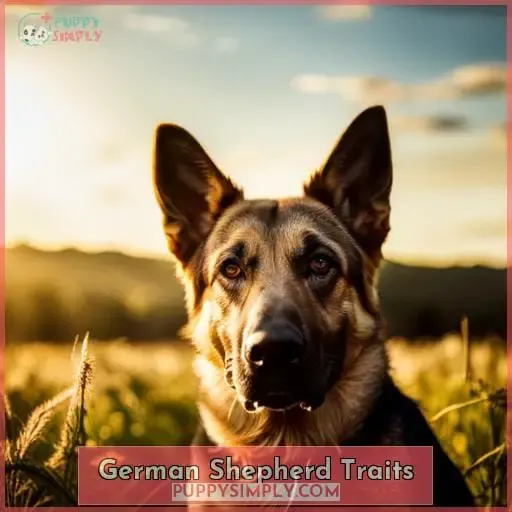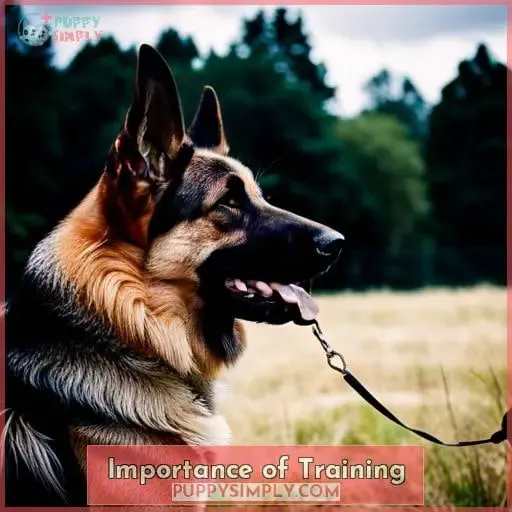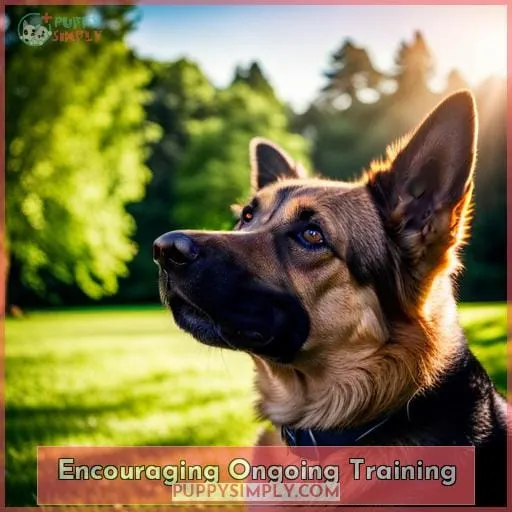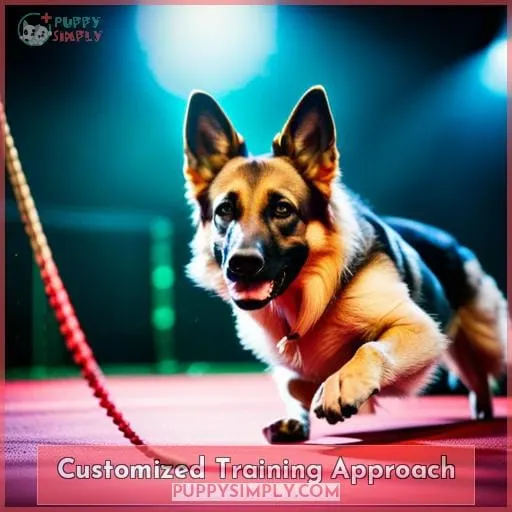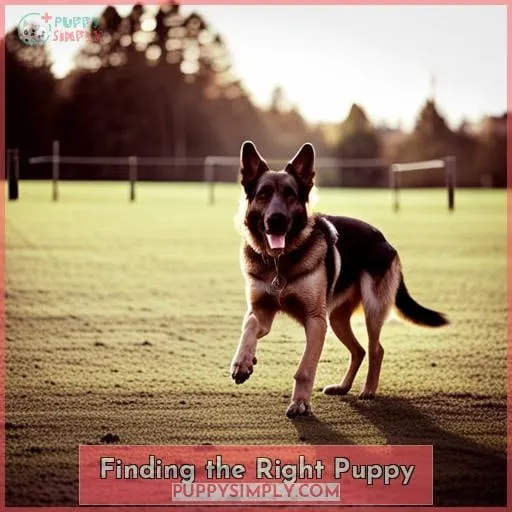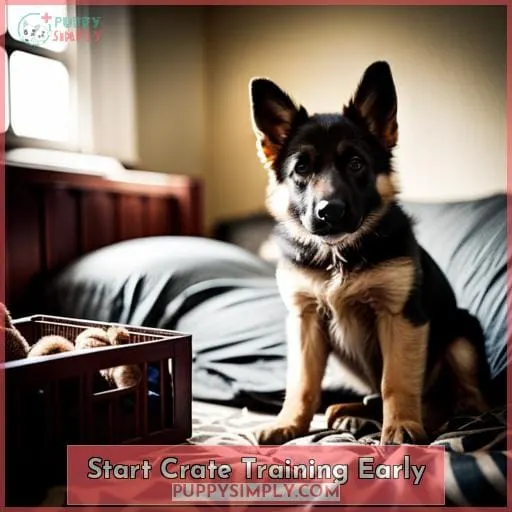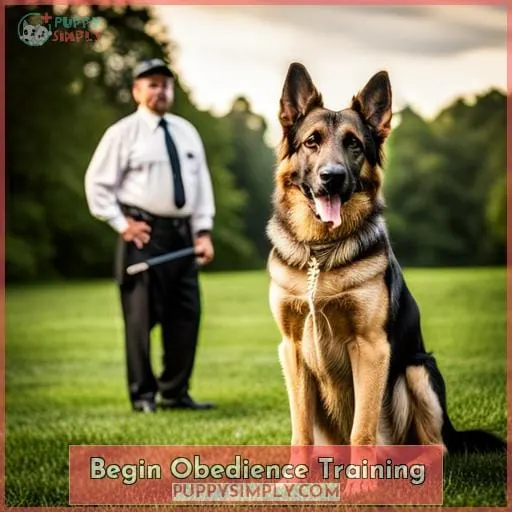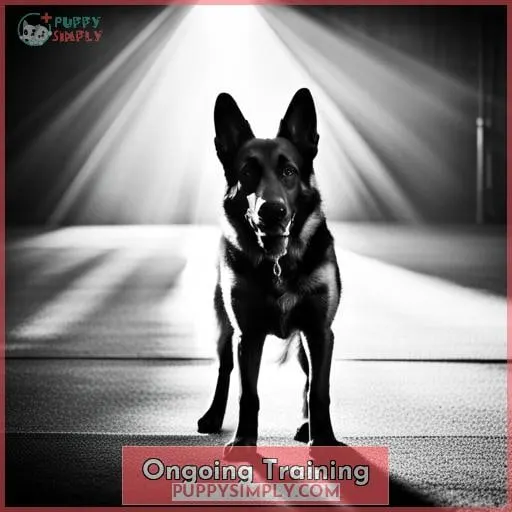This site is supported by our readers. We may earn a commission, at no cost to you, if you purchase through links.
 You’ve picked the perfect breed. With your dedicated training, the eager-to-please German Shepherd will be a loyal companion for life.
You’ve picked the perfect breed. With your dedicated training, the eager-to-please German Shepherd will be a loyal companion for life.
Their high intelligence allows them to quickly learn commands and tasks that stimulate their active minds.
Establish yourself as the confident leader through firm, fair, and consistent training.
With proper socialization as a puppy and ongoing positive training methods, your German Shepherd will thrive by your side, protecting and serving your family.
Table Of Contents
- Key Takeaways
- German Shepherd Traits
- Importance of Training
- Encouraging Ongoing Training
- Customized Training Approach
- Finding the Right Puppy
- Critical Early Socialization
- Start Crate Training Early
- Begin Obedience Training
- Ongoing Training
- What’s Your Experience?
- Frequently Asked Questions (FAQs)
- How much exercise does a German Shepherd puppy need each day?
- What kinds of toys and games are best for training and entertaining a German Shepherd puppy?
- How can I teach my German Shepherd puppy not to nip or bite during play?
- Is it better to use food rewards or praise during German Shepherd puppy training?
- What are some common mistakes people make when training a German Shepherd puppy?
- Conclusion
Key Takeaways
- German Shepherds excel with focused, task-oriented training activities due to their attentiveness, intelligence, and versatility.
- They require knowledgeable owners who provide structured, customized training approaches tailored to the individual dog’s needs and preferences.
- Well-bred German Shepherds with eager-to-please temperaments tend to pick up on commands relatively quickly.
- Consistent, ongoing socialization and training is crucial to provide impulse control and curb problematic behaviors resulting from boredom or excess energy.
German Shepherd Traits
As serious, tall, and well-behaved dogs, German Shepherds were originally bred for herding and watching over cattle.
With origins in late 19th century Germany, they’re similar to Mastiff-type dogs and linked to those used by the Ancient Romans.
Requiring constant stimulation, exercise, and attention, their herding history led to traits like attentiveness, search drive, quick reflexes, and protectiveness.
Serious Working Dogs
The history of the German Shepherd Dog is deeply rooted in herding, as the breed required specific training to gather cattle with precision.
Bred to:
- Listen intently
- Search quickly
- Follow orders
More protective instincts than some other breeds.
Excel at:
- Focusing on
- Completing a task
Herding History
You’re often amazed by the German Shepherd’s history as a herding dog bred for specific skills like precision gathering, attentive listening, and quick reactions.
These traits are deeply ingrained in their DNA and have made them successful at herding.
Their protective instincts make them more vigilant than other breeds, while their high intelligence presents unique challenges during training.
Socialization strategies and obedience success are essential to harnessing the full potential of these remarkable dogs.
Importance of Training
With their high energy levels and need for constant stimulation, German Shepherd puppies will likely expend their energy through demanding your attention and engaging in activity.
Thriving when trained, especially by owners knowledgeable about the breed, German Shepherds benefit from going beyond basic training to more advanced activities.
To discourage destructive behaviors, be sure to provide your German Shepherd with adequate outlets for their intelligence and versatility through formal training tasks.
High Energy Levels
Your German Shepherd’s boundless energy demands constant stimulation and attention through training.
- Mental stimulation through interactive games and training exercises.
- Socialization activities to build confidence.
- Recall training for safety and impulse control.
- Leash walking provides needed physical activity.
Thrive With Training
German Shepherds thrive when properly trained early and consistently. They have a high aptitude to follow directions and please owners through tasks and activities that engage their intelligence.
| Week | Training Focus | Goals |
|---|---|---|
| 1 | Socialization | Exposure to sights and sounds |
| 2 | Housetraining | Accidents reduced by 50% |
| 3 | Basic Commands | Sit, stay, come, down |
| 4 | Leash Walking | Loose leash walking |
| 5 | Advanced Commands | Retrieve, track scent |
Without proper training outlets, German Shepherds may engage in destructive behaviors from boredom or excess energy.
Customized training that analyzes personality and temperament can yield better progress by discovering preferred activities.
Encouraging Ongoing Training
You can encourage ongoing training for your German Shepherd by providing them with tasks and activities to prevent boredom.
Their loyalty and eagerness to please make training intrinsically rewarding for them.
Give your dog something to do on a regular basis to tap into their natural abilities.
Prevent Boredom
Frequently take your German Shepherd on walks and provide mentally stimulating activities to prevent boredom-induced destructive behaviors.
Without proper outlets for their intelligence and energy, German Shepherds may engage in chewing, digging, or barking.
Make training and play time interactive by:
- Using puzzles
- Using toys that dispense treats
- Hiding kibble around the house
- Playing scent games
- Varying your training locations and commands
This mental enrichment keeps them happily occupied.
Loyalty Through Tasks
Without enough activities to occupy their minds and fulfill their instinct to work, your German Shepherd may engage in undesirable behaviors.
Provide opportunities for your dog to demonstrate loyalty.
Use training to encourage good behavior through tasks.
Match activities to your dog’s energy level.
Seek professional guidance on appropriate tasks.
Training gives German Shepherds an outlet for their devotion and intelligence. Adjusting activities to suit your dog’s needs strengthens your bond.
Customized Training Approach
You’ll want to analyze your German Shepherd’s unique personality and temperament to discover his preferred activities.
Learn proper training methods you can adjust and individualize to your specific dog’s needs, which will enhance the effectiveness of his upbringing and training.
Doing so allows you to approach training in a customized way.
Analyze Personality
The next consideration is analyzing your German Shepherd’s personality and temperament to customize the approach to training. This individualized method can enhance the effectiveness of the dog’s upbringing by catering to its specific preferences and inclinations.
Consider aspects like the dog’s:
- Activity level
- Independence
- Focus and attention span
When tailoring training techniques, an individualized program allows you to highlight your dog’s strengths while addressing areas needing more development.
| Independent | Aloof | Timid |
|---|---|---|
| Outgoing | Friendly | Shy |
| Fearless | Affectionate | Nervous |
Discover Preferences
Don’t just go in blind; discover your German Shepherd’s preferred activities to tailor training that works for them.
- Ball games
- Trick training
- Agility courses
- Scent training
An analysis of your dog’s preferences allows you to personalize activities and approaches for maximum training enjoyment. Individualized training utilizes behavioral insights to bring out your German Shepherd’s strengths.
Finding the Right Puppy
When looking for a German Shepherd puppy, you’ll want to locate reputable breeders or rescue organizations that can match you with the right dog for your lifestyle.
Discuss your needs with the breeder and look for an eager-to-please puppy with an intelligent yet obedient temperament that responds well to consistent training from an early age.
Socialization and training timelines can vary, but well-bred German Shepherds tend to pick up on commands quickly.
Reputable Breeders
When looking for your German Shepherd pup, you’ll want to find one from a reputable breeder or rescue that can match a puppy to your lifestyle.
Seek recommendations, ask questions about health and temperament, and ensure ethical breeding practices.
Selecting the right German Shepherd puppy from a responsible source will set the stage for an easier training journey.
Match Lifestyle
Once you’ve found a reputable breeder, make sure to discuss your lifestyle and preferences.
This will help you find a puppy with a matching temperament and personality.
Consider your commitment to training, as German Shepherds require ongoing mental and physical stimulation.
Be realistic about exercise routines and adventures you can provide.
The breeder can help select a puppy with an activity level and playfulness suiting your lifestyle, easing behavioral hurdles.
Appropriate socialization and training build confidence.
Critical Early Socialization
You must properly socialize your German Shepherd puppy during the critical window before 12-16 weeks old.
Socialization builds confidence by safely exposing pups to new sights, sounds, people, and situations.
Pay particular attention to confidence building around novel stimuli to set up good behaviors later.
Confidence Building
Your German Shepherd puppy’s assurance blossoms through safe interactions with diverse people and environments during the critical socialization window.
- Confidence-building games
- Fear desensitization
- Positive exposure
- Trust exercises
- Incremental challenges
Sounds and Sights
As you safely expose your puppy to new sights, sounds, and smells during this critical socialization window, proper development of confidence is crucial.
Introduce various desensitization techniques like playing recordings of sirens or exposure training with umbrellas opening.
This stimulus response and sensory familiarization allows environmental adaptation, prepping your pup for adulthood.
Desensitization Techniques
- Playing recordings
- Doorbell sounds
- Vacuum cleaner noise
- Sirens and horns
-
Thunderstorm tracks
Exposure Training
- Umbrellas opening
- People in hats
- Bikes and skateboards
- Sudden noises
- Slippery surfaces
Start Crate Training Early
You’ll want to begin crate training your German Shepherd puppy as soon as you bring them home.
Using a crate prevents separation anxiety by getting pups comfortable with alone time and aids housetraining by giving them an instinct not to soil their sleeping area.
Start by having your puppy take naps and eat meals in their crate, then gradually increase the duration.
Separation Anxiety Prevention
Prevention of a pup’s distress when left alone requires that you initiate crate acclimation during feeding occasions and brief daytime departures.
Introduce your German Shepherd puppy to alone time in stages, making crate training part of his routine.
Start with meals, naps, and very short solo intervals, providing affection upon your return.
Incrementally increase duration and randomness to accustom him to separation, quelling future anxiety through preventative means while ensuring your pup knows he’s your full support.
Housetraining Aid
Since crate training helps prevent separation anxiety, you’ll also find it invaluable for aiding housetraining as you start it early.
Effective methods like crating when you can’t supervise teach bladder control and prevent indoor accidents.
Strategies that confine yet comfort when you’re away establish good potty habits quickly.
This efficient tool gives freedom through understanding, preventing messes while building confidence.
Begin Obedience Training
You can begin teaching your German Shepherd puppy basic obedience commands like sit, down, and stay, starting around 3 months of age.
Enroll your pup in a puppy obedience class for additional socialization and training opportunities.
Start impulse control training early too, as it helps curb potential problem behaviors stemming from their energetic nature.
Commands
You’ll then start teaching basic commands like sit, down, and stay as their crate training aids prevention of separation anxiety.
Use positive reinforcement training techniques with treats and praise.
Be consistent with verbal cues and hand signals for each command.
Practice short, daily recall training sessions in safe areas.
Once mastered, advance to off-leash obedience and public spaces.
Impulse Control
Once you’ve started teaching basic commands, you’ll need to begin working on impulse control to curb potential problem behaviors.
As German Shepherds mature, impulse management through various training strategies helps instill good behaviors.
Read your dog’s cues during distraction training to know when more patience building is needed before expecting a response.
Structure these impulse control lessons to tap into their eagerness to please owners.
Ongoing Training
You must provide consistent training for your German Shepherd, focusing on impulse control and advanced activities.
As they mature from adolescence to adulthood, transition to appropriate nutrition and dedicated tasks suited to their intelligence, such as tracking, scent work, or agility training.
Keep your German Shepherd engaged through ongoing work and training to curb problematic behaviors.
Focus Activities
Two key ways you’re able to keep your German Shepherd engaged in focused training activities long-term are:
- Advancing to tracking, scent work, or agility as they mature.
- Sticking to a consistent training regimen tailored to their needs.
Providing mental stimulation through varied interactive tasks and enrichment exercises prevents boredom while allowing them to showcase their intelligence and versatility through activities that play to their strengths.
Consistency is Key
You’ve got to keep up consistent and ongoing training from nine months to two years.
Maintain regular training routines.
Build persistence through repetition.
Reinforce desired behaviors.
Stick to effective training techniques.
Consistency is key for German Shepherds to thrive. They need rigorous mental and physical stimulation.
Establish training habits and daily enrichment activities.
Stay committed to reinforcing training.
With routine and persistence, your German Shepherd will be obedient, focused, and confident.
What’s Your Experience?
After discussing the importance of ongoing training for German Shepherds, let’s hear about your experiences training this intelligent breed. You may have developed some favorite training techniques or found unique ways to handle behavioral challenges with your pup.
Share what’s worked for effective reinforcement and handling any resistance. We can all benefit from hearing about individualized approaches you’ve found successful.
Training Techniques:
- Positive Reinforcement
- Clicker Training
- Lure Reward
- Hand Signals
- Treat Dispensing Toys
Behavioral Challenges:
- Separation Anxiety
- Excessive Barking
- Chewing
- Digging
- Jumping
Frequently Asked Questions (FAQs)
How much exercise does a German Shepherd puppy need each day?
Provide your German Shepherd puppy with at least two hours of exercise daily through several activity periods.
German Shepherds thrive on human interaction and mental stimulation, so play games and train along with walks.
What kinds of toys and games are best for training and entertaining a German Shepherd puppy?
Interactive toys like tug ropes, retrieving toys, chew toys, and agility equipment are great for German Shepherd puppies.
These stimulate their natural drives, provide mental and physical enrichment, build confidence, and aid training.
Prioritize toys promoting bonding, impulse control, and appropriate chewing.
How can I teach my German Shepherd puppy not to nip or bite during play?
Redirect your puppy’s nipping during play with a toy or chew.
Firmly say no, offer an alternative, and praise good behavior.
Be patient and persistent. Nipping is normal but must be redirected, not encouraged.
Set rules consistently, and your pup will learn.
Is it better to use food rewards or praise during German Shepherd puppy training?
While both rewards are useful for training, food rewards often provide clearer feedback and motivation for a puppy first learning behaviors.
Focus praise on effort and progress in training rather than just the end result.
Most importantly, make training enjoyable through patience, consistency, and bonding.
What are some common mistakes people make when training a German Shepherd puppy?
When training a German Shepherd puppy, common mistakes include:
- Inconsistent commands
- Lack of socialization
- Using punishment instead of positive reinforcement
To ensure success, stay consistent in your approach and provide plenty of opportunities for social interaction.
Conclusion
Did you know that German Shepherds have ranked as the 2nd most popular dog breed for over 20 years?
With their eager-to-please temperament and high intelligence, proper training is key for these energetic working dogs.
Establish clear leadership and reward desired behaviors to develop the loyal companion they long to be.
Consistency, socialization, and age-appropriate training tailored to your dog’s unique personality are the keys to success.
Train patiently and your German Shepherd will thrive as your faithful friend for years to come.

